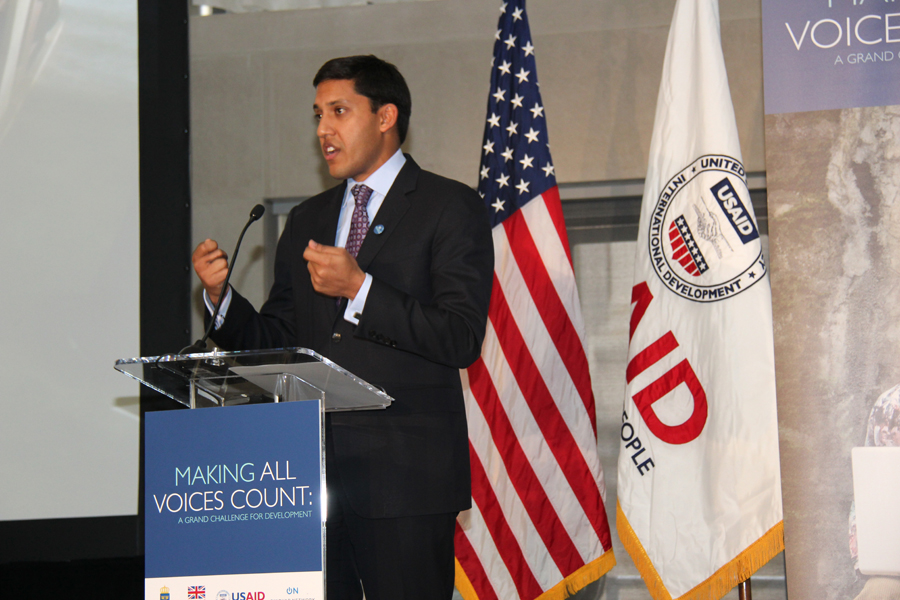Remarks by Administrator Rajiv Shah at the Launch of Making All Voices Count

It is wonderful to welcome you today for the launch of our fourth Grand Challenge for Development: Making All Voices Count.
Earlier this week, there was an article in The New York Times about a wave of violence surrounding a hotly contested election for ward councilor in a small, impoverished town in South Africa.
The town isn’t alone. In fact, since 2010, violence in local elections in South Africa has led to the death of over 40 politicians. The thing is—ward councilor isn’t such a popular job in and of itself. It pays little and has thankless responsibilities. But what it has—what has made it so valuable that others would kill for it—is a steady stream of kickbacks, bribes, and off-the-book deals.
For this town in South Africa, violence and corruption hasn’t just cost lives. It has diminished the faith of citizens in their own government.
We know that every year corruption costs the world more than $1 trillion—undermining progress in everything from infrastructure to education. In fact, the World Bank estimates that there is a 400 percent governance dividend at stake—meaning that if countries improve corruption and the rule of law, they could reap a four-fold increase in per capita income—and a 75 percent reduction in child mortality.
These are extraordinary outcomes, and if we’re going to capture this dividend, we need more than the commitment of development agencies. We need to help raise voices of all citizens—and empower their governments to respond.
That’s the spirit behind today’s launch—to build on President Obama’s call for open government and inspire a global movement to end corruption and strengthen accountability. This Grand Challenge calls on the world’s brightest innovators, entrepreneurs, and engineers to design breakthrough technologies and approaches to make all voices count. In fact, we’ve already seen some cutting-edge examples at work around the world.
In Indonesia, we work with a local organization to create mini atlases that map community assets like clinics and schools. The organization posts these mini-atlases in neighborhood public spaces—helping to inform the community and encourage their participation in their government.
And in Bangalore, India, students from Colgate University helped design exit surveys for citizens as they leave government offices. The team then maps high corruption and low efficiency areas—and shares that data with local media outlets, theater actors, and musicians to encourage greater grassroots demand for change.
But the challenge before us isn’t just innovation. It is taking these innovations to scale—harnessing the dramatic reach of technologies like the mobile phone and GIS tools to raise the voices of millions of people across continents.
Already, three-quarters of the world has access to a mobile phone. And the number of mobile subscriptions has grown from fewer than 1 billion in 2010 to over 6 billion—the majority of which is in developing countries. This mobile revolution has the potential to not only deepen citizen engagement, but facilitate the government’s response.
In fact, there is perhaps no better example of the power of mobile technology to fight corruption and transform society than electronic payments and mobile money. In 2011, when the Kabul Bank collapsed after insiders stole nearly $1 billion in savings, we took a tough approach—demanding the bank go after those responsible. But we also started designing a new system that would be far less prone to corruption.
We built a network called the Better Than Cash Alliance with more than a dozen partners—including the Omidyar Network, Visa, and the governments of five countries—to accelerate the adoption of electronic payments around the world. In fact, when the government of Afghanistan started paying its employees and police officers through mobile phones, it immediately cut out so much graft that some employees actually thought they were getting a 30 percent raise.
It won’t be easy to transition global systems over to mobile money, but we also know the power and impact it can have. In tough, tough settings, we can create environments that are more resistant to corruption and graft; that are more transparent; and that provide more opportunities for poor families—and especially women—to have a safe place to receive payments, save money, and invest in their future for the very first time.
But we’re particularly excited today, because we’ve already seen what’s possible to achieve when you bring problem-solvers together from around the world. Today’s Challenge builds on an extraordinary series of competitions over the past two years.
Our first Grand Challenge, Saving Lives at Birth, has already resulted in some exciting innovations—like an affordable bag-mask for infants—that are already making a difference on the ground.
Last November, we launched an education Grand Challenge and have recognized more than 30 award finalists—including local organizations that are bringing e-readers and smartboards to rural communities.
And just this past June, we launched our third Grand Challenge to generate clean, affordable energy solutions for smallholder farmers.
In total, these programs have attracted more than 1,600 applications—30 percent of which had never worked with our Agency before and 50 percent of which came from the developing world.
And for an Agency that once wasn’t particularly well known for looking outside the Beltway, these results have been stunning. Because the truth is—exciting, novel ideas can come from anywhere. And by focusing the world’s efforts on specific areas where technologies and innovations can accelerate progress, we can tackle challenges once thought intractable – ending maternal and child death; getting all children reading; and now fighting pervasive corruption to help unlock democratic opportunity around the world.
Thank you.






Comment
Make a general inquiry or suggest an improvement.